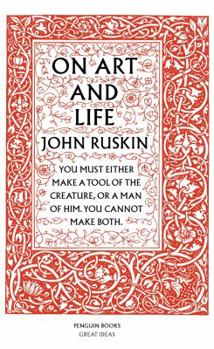On Art and Life
Select Format
Select Condition 
Book Overview
Throughout history, some books have changed the world. They have transformed the way we see ourselves - and each other. They have inspired debate, dissent, war and revolution. They have enlightened,... This description may be from another edition of this product.
Format:Paperback
Language:English
ISBN:0143036289
ISBN13:9780143036289
Release Date:September 2005
Publisher:Penguin Group
Length:97 Pages
Weight:0.75 lbs.
Dimensions:0.3" x 4.4" x 7.1"
Age Range:18 years and up
Grade Range:Postsecondary and higher
Customer Reviews
2 ratings
Beauty Remembered
Published by Thriftbooks.com User , 17 years ago
Nietzsche said that with the death of the sacred, Beauty would continue, albeit accidentally. Mr. John Ruskin, however, set his sights on an earlier age, developing six principles that could be applied to gothic beauty, and in so doing, in my eyes, set down the principles for Beauty in general. The principles are: Rudeness, Changefulness, Naturalness, Grotesqueness, Rigidity and Redundancy. In our post-industrial age, perhaps the most telling is the first, Rudeness. Mr. Ruskin defines Rudeness as the introduction of originality into a work at the expense of a polished, finished product. What, you may ask? That's not how I do it at work! Me either brother, but it's nice to know why nothing I produce is beautiful. Which leads me to my next point concerning this little gem of a book. These principles can be applied, in my view, to Beauty in general, not just gothic. And it provides an interesting point of view with which to look at life. Suddenly, many of the 'best things' in life truly are free. I had no real education in aesthetics before reading this book, and have now delved deeper into the subject because of it. Maybe you will too.
Ruskin's sweatshop nightmare.
Published by Thriftbooks.com User , 18 years ago
We are now living in John Ruskin's nightmare, an industrialized, sweatshop world of mass-produced, unnecessary goods. Victorian Ruskin (1819-1900) believed in the need for individual creative expression. "You must either make a tool of the creature, or a man of him. You cannot make both. Men were not intended to work with the accuracy of tools, to be precise and perfect in all their actions. . . On the other hand, if you will make a man of the working creature, you cannot make him a tool. Let him but begin to imagine, to think, to try to do anything worth doing; and the engine-tuned precision is lost at once. Out come all his roughness, all his dulness, all his incapability; shame upon shame, failure upon failure, pause after pause: but out comes the whole majesty of him also" (pp. 14-15). Ruskin believed that we should never encourage the manufacture of any article not absolutely necessary. Anyone who purchases unnecessary goods is "a slave-driver." We should never demand an exact finish or perfection for its own sake, and we should never encourage imitation or copying of any kind, except for the sake of preserving records of great works (pp. 20-21). Ruskin was not only an art critic, he was a social visionary who, with brilliant insight, examined nature, architecture, politics, history, and myth in his writing. This Penguin Great Ideas edition of Ruskin includes extracts from THE STONES OF VENICE (1853) and THE TWO PATHS (1859). G. Merritt





